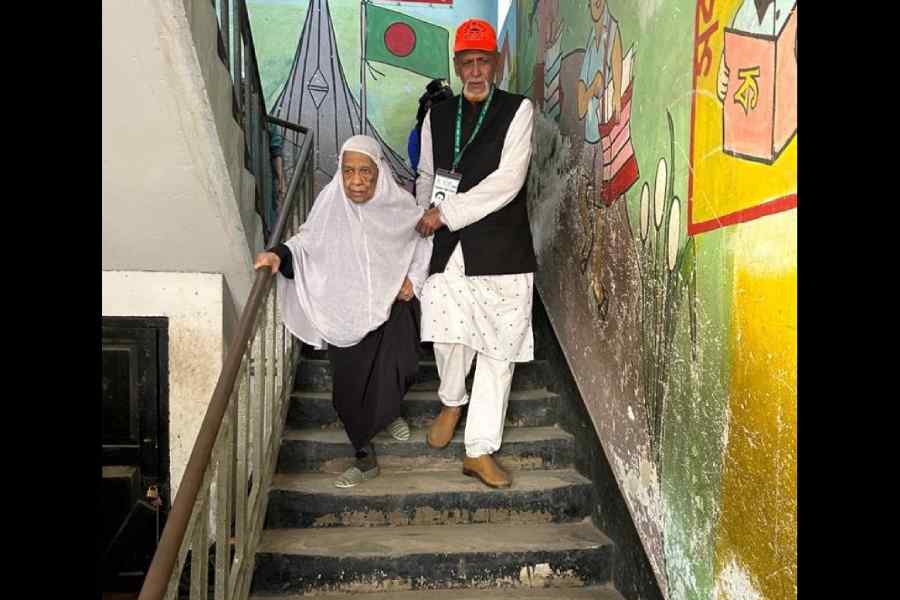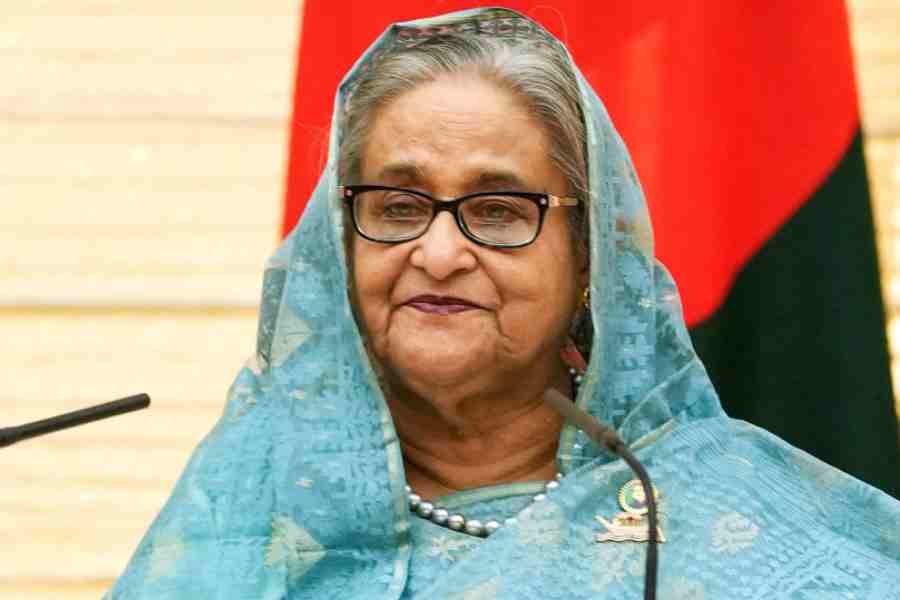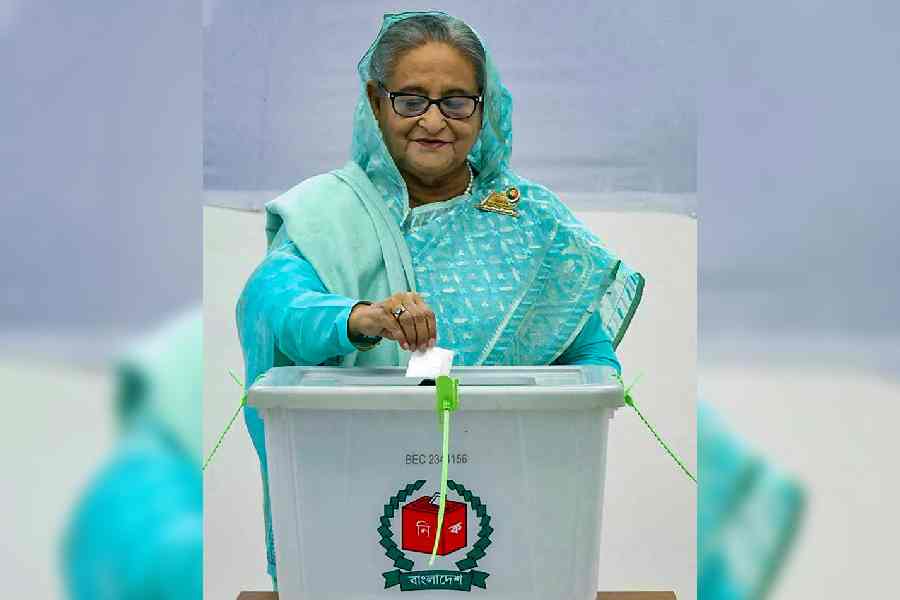Bangladesh Prime Minister Sheikh Hasina Wajed appeared to be sweeping back for a fifth term in power, counting trends robustly indicated late on Sunday night. Widely predicted ahead of elections boycotted by the Opposition Bangladesh Nationalist Party (BNP), Hasina’s continuance in power in Dhaka would be welcome news for New Delhi.
Hasina’s Awami League appears to have bagged more than 50 per cent of the seats in the general election. Election Commission sources said the Awami League had won over 200 of the 261 seats where counting had taken place, while 50 Independents had secured victory and the Jatiya Party had bagged 11 seats. This is Prime Minister Hasina’s fourth straight term in power and fifth overall.
Bangladesh on Sunday witnessed one of its most peaceful general elections with far fewer complaints of malpractice compared to past polls, but conversation centred on the voter turnout amid conflicting claims from the ruling Awami League and the BNP-led Opposition.
“Although we are not sure yet, on an average the turnout was 40 per cent,” chief election commissioner Kazi Habibul Awal said during a media briefing in the evening.
The polling percentage, sources said, varied across the country with the turnout above 50 per cent in several parts of Chittagong, and high in Barishal too, but as low as 15 to 20 per cent in parts of Dhaka and Mymensingh. The final turnout could touch 42 per cent, poll panel sources said.
“No major incident took place although there are allegations. We are looking into those. We will not claim that we performed well, but we tried hard,” Awal said.
Quoting the figures mentioned by Awal, Awami League general secretary Obaidul Qader thanked the people of Bangladesh and claimed a victory for democracy. “The BNP carried out terrorism and arson attacks to thwart the election, but the people rejected them through the ballot,” he told a news conference.
Qader said people had been able to vote for their preferred candidates, without intimidation or interference.
This narrative ruled the media space. Scores of commentators claimed the peaceful polling, with a 40 per cent turnout, could be deemed a success for Sheikh Hasina’s government.
Hasina was re-elected to Parliament from the Gopalganj-3 constituency. Hasina, 76, bagged 249,965 votes while her nearest rival, M. Nizam Uddin Lashkar from the Bangladesh Supreme Party, secured just 469 votes, bdnews24 reported.
The BNP and 15-odd like-minded parties boycotted the polls, claiming a free and fair election could not be held under Hasina. With backing from the US-led Western world, they had demanded that a caretaker government conduct the polls.
The BNP and its allies had carried out protest movements, which often turned violent, to try and discredit the election and keep the turnout low.
On Sunday, the BNP claimed the people had responded to its boycott call and that the election — where the contest was mainly between the official Awami League nominees and about 250-odd ruling party dissidents — was a “farce”.
Congratulating the people for staying away from the booths, senior BNP leader Abdul Moyeen Khan said: “I salute the people of Bangladesh for the sole reason that they have never compromised on the question of democracy.... Most of the polling stations were almost empty. So, our call for the election boycott has been successful.”

Hoor Banu, 95, at a polling station in Dhaka on Sunday. Sourced by The Telegraph
Voter turnout figures can hardly, however, be the sole indicators of the state of democracy in a country that has witnessed wild swings in polling percentages over the years, depending on the political situation and the scale of electoral malpractices.
The last general election in 2018, which the BNP had called a mockery before pulling out its candidates on polling day, had seen a turnout above 80 per cent. The one before, boycotted by the BNP, recorded around 39 per cent voting.
Bangladesh witnessed the lowest-ever turnout in its history in the controversial general election held in February 1996 under Khaleda Zia’s BNP government, which the Awami League had boycotted. The polling percentage was around 25.
Hasina assumed power within a few months as the February polls were countermanded and a fresh election, under a caretaker government, was held. The turnout was more than 54 per cent.
With early trends suggesting that about 50 Opposition candidates, mostly Awami League rebels, were ahead of the official nominees, the results began evoking interest among sections of the population.
The initial results indicated a defeat for the minister of state for civil aviation, Mahbub Ali (who eventually lost), and stiff fights for junior foreign minister Shahriar Alam, freedom fighters affairs minister Mozammel Haq and the co-chairman of the ruling party’s election steering committee, Kazi Zafarullah.
Swapan Bhattacharya, minister of state for local government and cooperative, and Enamur Rahaman, minister of state for relief and disaster management, too lost.
The defeats and prospective defeats of several Awami League nominees, including ministers and MPs, allowed the ruling party’s spin doctors to claim the elections had been held in a free, fair and competitive environment.
As the BNP has always had a strong support base in parts of Dhaka, its absence led to a near-desertion of streets in large parts of the capital such as Kawran Bazar, Farmgate, Tejgaon, Mohakhali and Banani.
Contrasting scenes were, however, seen in Dhaka localities like Mohammadpur, Savar, Dohar and Keraniganj where people queued up to vote.
“Why should I waste my vote?” Hoor Banu, a 95-year-old woman, told this correspondent while coming out of a deserted Suritola Primary School, a polling booth in the Dhaka-6 constituency in Old Dhaka.
In neighbouring Dhaka-2 constituency, the mood seemed upbeat. “People here are celebrating the polling day as Eid. The turnout here till 3pm was above 46 per cent,” Nasrul Hamid, junior power minister, told The Telegraph.
But many social media users questioned the credibility of the polls.
To a question on the polls’ acceptability (to the foreign media and the international community at large), Hasina shot back: “Whether people accept this election or not, it is important to me. So, I don’t care about its acceptance, no matter what the terrorist party says.”
Hasina, who cast her vote at a booth in the Dhaka-10 constituency, added: “Bangladesh is a sovereign and independent country. It may be a small country but it has a large population. I don’t bother about who says what, as the people are our main strength.”
In 2018, the alliance led by Hasina had bagged 96 per cent of the seats. Although there had been question marks on the 2018 election, it had earned acceptability following strong backing from neighbouring India.
Some analysts asked whether the same script would play out again, with Narendra Modi the first international leader to greet her on her almost certain victory.
“Hasina is a key player in this region’s stability. It’s unlikely that the Western bloc will challenge this equilibrium,” a strategic affairs expert said.












